A billionaire who cares
Updated: 2018-04-19 06:55
(HK Edition)
|
|||||||
Lui Che-woo grew up in the most diffcult times imaginable - now, late in life, he has committed himself to helping others to avoid the poverty he suffered in his youth. Honey Tsang reports.
Denied by fate in his pursuit of a good education, Lui Che-woo became a hard-driving entrepreneur and Hong Kong's third wealthiest person, but his hard passage endowed him with another quality, compassion.
There is a widely-accepted proposition that education guarantees prospects and Lui, at 88, does all he can to help others benefit from what he was denied. That's the motivation behind the LUI Che Woo Prize, an international award to clear a path to higher civilization for recipients.
Lui, a homegrown billionaire, property developer and hotelier missed out on an education in the 1940s because of the Japanese occupation.
Early one Tuesday morning at K. Wah Centre, North Point, Lui, ensconced in his conference room on the top floor overlooking vistas of Kwun Tong - which are the lands his company reclaimed during the 1950s - opened up to China Daily.
"At the time, the war-torn period in Hong Kong was a harrowing memory," recalled Lui.
Lui's always had a witty, chirpy conversational style exuding warmth and charisma. However, this time he took on a more serious tone as he described his early years. "I dropped out as a junior from secondary school. It was grueling for me, in my teens, to earn a living on my own."
Grueling hardly describes what life was like. Corpses were stacked in the street. There was mass starvation, and also, as he recalled with deep feeling, cannibalism.
Thereafter, he learned to take care of his money and resources, treasuring every penny. Lui's life on the war-torn streets of Hong Kong impelled him to dream big, so that one day he might heal from the scars of war.
What was different for Lui was that he became an idealist. He wanted everybody to realize his dream. He founded K. Wah Construction Company in 1955. Six decades later, the company has morphed into an international conglomerate earning hundreds of billions of dollars.
In 2015, Lui set up the LUI Che Woo Prize - Prize for World Civilisation, with his heart set on "building a better world." Lui believes wealth encompasses more than cash and property assets; it includes an obligation to work for the betterment of the society as a whole, even for all mankind.
To the best of his ability, Lui has worked to realize his vision. Since 2016, Lui has presented prizes of HK$20 million each to laureates from around the world, in recognition of their unconditional efforts to foster morality, harmony and positive energy. Six laureates have been awarded so far.
Currently, the cash award of each LUI Che Woo Prize is around 2.5 times that given to recipients of the Nobel Prize.
Nobels have been handed out since 1901 for remarkable achievements in the arts and sciences and contributions to global peace. Lui's prize is also higher than the $1.2 million Shaw Prize, established by the late Hong Kong philanthropist Sir Run Run Shaw in 2002 to honor individuals for academic and scientific breakthroughs.
The LUI Che Woo Prize is still in its infancy. But Lui believes that the prize stands out, because it recognizes those dedicated to the betterment of humanity. He views it as a "seed", instilled, blossoming from his idea of constructing peaceful and sustainable societies.
"I've wished it to seep deeply into the soil of societies - and into people's hearts. One day it's going to sprout, spread and be reaped."
The path to philanthropy
The mogul was born in Jiangmen, Guangdong province in 1929. He was just a boy when the Japanese army launched an aerial attack on the Chinese mainland, killing Zhang Zuolin, the warlord of Manchuria, in a train in 1928. Fretting that the Japanese forces were soon to raid Guangdong, Lui's family decided to flee from their hometown, later settling in Yau Ma Tei, Hong Kong, in 1934. The peaceful life in Hong Kong lasted until December 8, 1941, when Japanese forces invaded, placing Hong Kong under occupation. The city was plunged into chaos. His family's business closed. He was forced to leave school.
Lui knew he had a knack for business, even as a boy. On Hong Kong's war-ravaged streets, food was scarce and people went hungry. His instincts showed him the potential for street food business and how to capture it. As a teenager, he hit the streets and sold his own version of sachima - a traditional Chinese sweet and crispy pastry tweaked with affordable ingredients. At 13, Lui made a fortune, accumulating 2 million Japanese military notes (equivalent to around HK$500,000 at the time). The amount was far more than enough to purchase a whole street of properties at that time.
After the war, Lui dabbled in selling automotive parts. He studied English after, believing that mastery of the language would create even greater opportunities. Then, the owner of the automotive company decided to close up shop. Lui stepped forward in a bold move and offered to buy him out for HK$30,000. Lui saw a big future in car parts, with enormous demand on the horizon on the Chinese mainland when the central government began improving the nation's infrastructure. Lui was right. At 20, he began to increase his fortune, selling vehicle parts to mainland partners.
Lui didn't stake his future on car parts. His unceasing ambition drove him to venture into something bigger, grander - heavy machinery. Hong Kong was on the track for modernization and development. Construction hardware was scarce, Lui noted. Probably it was by fluke, or, partly through the well-established business network he'd built in his early years, Lui was able to get unwanted US military machinery from Okinawa, through a friend who had studied at Japan's Waseda Univeristy. His friend had connections with American soldiers based in Okinawa. Lui was able to buy jeeps, earth movers, excavators and cranes.
In the early 1950s, Hong Kong's government laid out plans to develop the barren Kwun Tong area into a pivotal point for future development. In 1955 Lui founded K. Wah Construction Material Ltd. He became a major player in the construction of Kwun Tong, taking on around 80 percent of infrastructure projects - be it mountain leveling, reclamation or road paving - in Lok Fu, Sau Mau Ping, Lam Tin and Yau Tong Bay.
Later, he made longer strides, venturing into property investment in the 1960s. In the 1980s, he moved into the hotel industry and then, in 2002, he set his sights on Macao's lucrative gambling industry. Today, he is chairman of the K. Wah Group and the Galaxy Entertainment Group. He owns businesses producing construction materials, managing real estate, and operating hospitality and gambling centers. His company's total market capitalization is more than HK$329 billion.
The hardships during the Japanese occupation of Hong Kong in the 1940s underpinned Lui's entrepreneurship and his philanthropy. He is among only a few moguls in town who are single-minded and pertinacious in pursuit of charitable works.
"I've wished for lasting peace in the world, so people all over can live in a blessed environment," he explained.
Wanting to do his part to realize his dream, Lui inaugurated the LUI Che Woo Prize, placing emphasis on the civilized virtues of morality and benevolence. Lui's been an avid philanthropist for decades, giving away large sums of money to support education, innovation and technology, and arts and culture, both in the Hong Kong SAR and on the Chinese mainland. More recently he has striven to deepen his commitment.
"Once I got the ability to give back to society, I've been doing the best I can," he said. To Lui, financial success doesn't guarantee happiness, but redounding to the community can.
Time to reap
In 2017, Xie Zhenhua, China's special representative on climate change affairs, was awarded the LUI Che Woo Prize for Sustainability. Xie is revered for his long-standing endeavor combating climate change, crowned by the successful conclusion of the Paris Agreement in 2015, to which he had become a principal instigator. The multinational treaty committed 175 countries and regions to reducing global carbon emissions.
On the day he received the prize, Xie announced he would donate all his cash award (HK$20 million) to Tsinghua University Education Foundation, his alma mater, to fund efforts to reduce the effects of climate change.
"While Lui doles out a fortune every year to laureates with great generosity, we (the awardees) should also be responsible and continue his efforts by contributing to society," Xie told China Daily.
Tsinghua University used the money Xie donated to create its "Global Climate Change and Green Development Fund" in November 2017. The fund's purpose is to facilitate international collaboration on low-carbon development and to offer scholarships for students in related disciplines.
The LUI Che Woo Prize is comprised of three categories: sustainable global development, the betterment of human welfare and the promotion of positive life attitudes to enhance positive energy. Every year, one recipient in each category is granted a cash award, a certificate and a trophy.
In 2017, Landesa Rural Development Institute, an international non-governmental organization, was crowned with the Welfare Betterment Prize. It was to honor its success in securing land rights for over 120 million of the world's poorest families in more than 50 countries over the past 50 years.
Funds from the prize have helped Landesa open an office in Tanzania, Africa. Closer to home, Landesa sees momentum in supporting land tenure reform in the Chinese mainland, which is expected to offer secure land rights to more than 100 million women, said Chris Jochnick, Landesa's president and CEO.
"Lui's Prize itself is an opportunity for organizations to not only sustain the good work being done to promote human civilization, but also offers a chance to pursue new innovations that can enhance and deepen impact," said Jochnick.
The Positive Energy Prize was bestowed on the International Paralympic Committee (IPC), for its continuous support of the Paralympic movement. As of now, the IPC has devoted the prize money to supporting the development of Para sports by providing grants to IPC members.
"The (LUI Che Woo) award identifies that our prime driving force is our Paralympic spirit, but the other name for the Paralympic spirit is 'Positive Energy'. So it's great that these two sets of thinkers and actors can come together. It's a great honour," said Philip Craven, the former president of the IPC.
Zeal for the nation
Lui has special affection for the motherland. His heartrending wartime experiences enhanced his passion to serve the nation, igniting his inner drive to help shape a prosperous society and a stronger country. He's held tightly to his belief that education empowers an individual, which in turn empowers a nation. He had to drop out of high school because of the war. Now, late in life he aspires to provide schooling to as many children as possible on the mainland.
"I still recall vividly that people said 'People in China are illiterate and ignorant.'" Lui said. Some believed that was part of the reason for the humiliating defeat under the Japanese yoke, he added.
Lui's notable, earlier contributions trace back to the 1980s, when he donated HK$3 million to construct Lui Che-woo Hall at Wuyi University in Jiangmen. After learning of dire living conditions in Kunming, the capital of Yunnan province, he forged a project named "Hope Primary School". Working with the Ministry of Education, Lui donated resources to catalyze reconstruction of 122 primary and secondary schools in eight provinces on the mainland.
In Hong Kong, Lui has contributed support to the local education sector for decades. He has set out capital for facilities at major universities such as the University of Hong Kong and the Chinese University of Hong Kong.
Lui has also donated to American and Canadian universities. It's his way of giving back to the places where he has profitable hotel businesses but he also believes it sets a good example for Chinese people.
The LUI Che Woo Prize is considered the zenith of Lui's lifetime philanthropy. All his charitable works are expressions of his conviction that education is key to a prosperous and harmonious relationship with society and the natural world.
From age 13, Lui has been in business - that's over 70 years. He's a tycoon now with hotel and property empires, but he's never been a materialist. He requested that all his children start at the junior level of his company, along with everyone else. He does his best to avoid nepotism.
Under the glaring studio lights, he remained fresh and unfazed during the interview. Every now and then, he took up a ceramic cup and sipped his favorite Chinese tea, while enjoying causal exchanges with the studio crew and his own staff members who accompanied him.
Through all the trials and then the success, his positive, benevolent attitude has maintained his good-natured approach. A crisply articulate and sharp octogenarian, he clearly enjoys communicating.
Contact the writer at
honeytsang@chinadailyhk.com
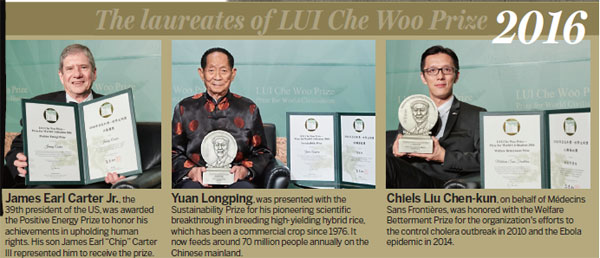
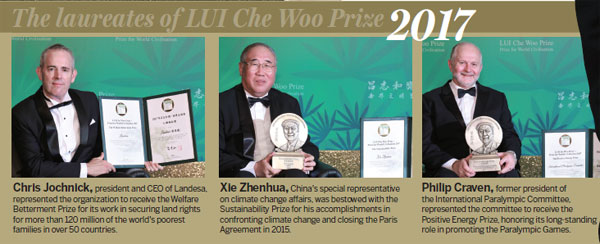
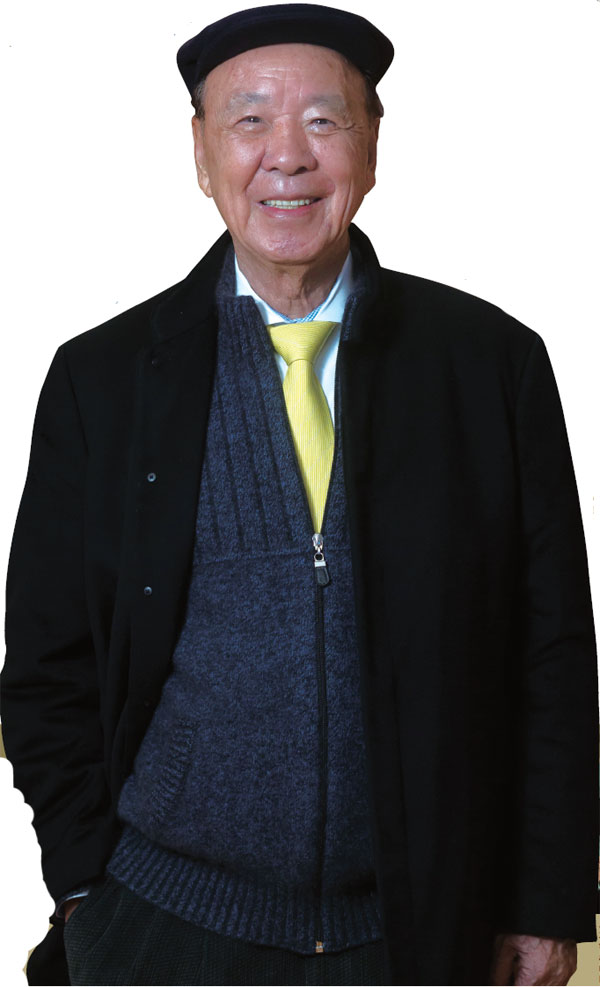
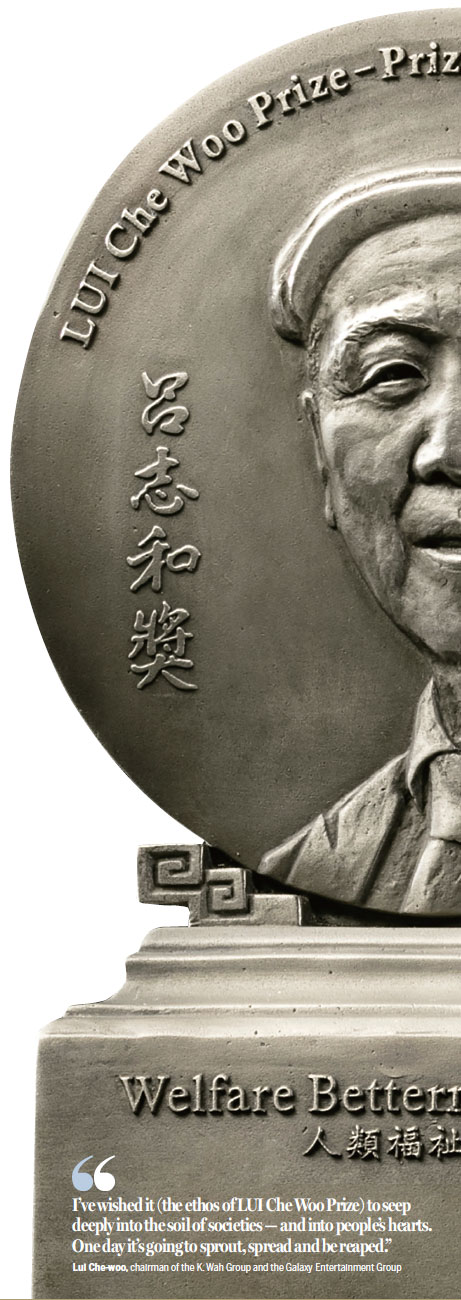
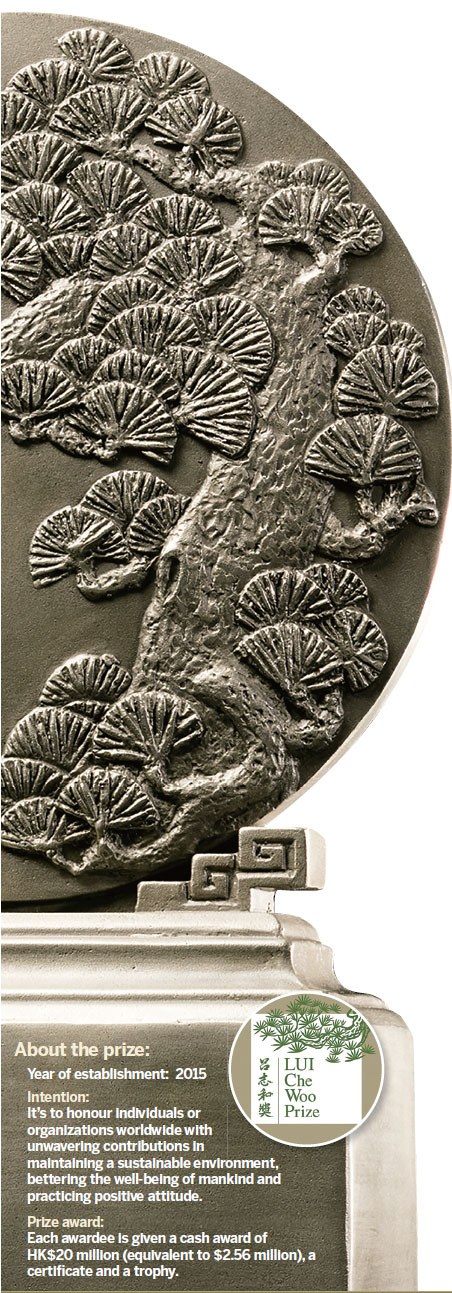
(HK Edition 04/19/2018 page8)